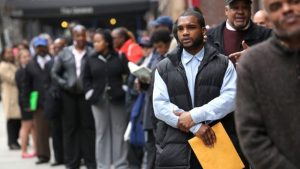(Akiit.com) The most recent unemployment rate report seems to contain nothing but good news. The overall unemployment rate is down to 3.8 percent, the lowest that it has been since 2000. The Black unemployment rate, at 5.9 percent, is lower than it has ever been. With the white unemployment rate at 3.5 percent, the ratio between Black and white unemployment, usually stuck at around 2, is below 1.7 percent, a historic low. While it is risky to make conclusions about Black unemployment, given month-to-month fluctuations (the last time 45 crowed about low Black unemployment rates in January, the number shot back up the following month by nearly a full percentage point), it is clear that the employment situation for African Americans has improved in the 500 or so days since 45 took office.
To be sure, much of the improvement in the labor market can be attributed to the Obama recovery. President Obama put everything in place to ensure that the labor market improved. Still, it would be churlish to deny that some 45-inspired policies may have improved the employment situation. With economic growth nearing 3 percent, and with business confidence stable, more than 220,000 new jobs were created in May. Tax cuts have encouraged businesses to add employees; the fact that wages have increased by more than 2  percent suggests some slight tightening in the labor market. Good news, right? So why aren’t workers dancing?
percent suggests some slight tightening in the labor market. Good news, right? So why aren’t workers dancing?
Black teens have hardly any reason to dance. Although the unemployment rate among Black teenagers dropped nearly ten percentage points, from 29 percent to 19.6 percent, a big part of this drop is contained in the fact that fewer teens are either working or looking for work. A year ago, there were 788,000 Black teens in the labor market, but the number had dropped to 681,000 last month. Thus, fewer teens were working last month (547,000) than a year ago (579,000). Even though many teens have dropped out of the labor market because they don’t think they can find work, it is likely that more will look for work this summer. It is extremely unlikely that the lower unemployment rate for teens will sustain through the summer unless businesses are strongly motivated to hire part-time and temporary workers this summer.
Teens have no reason to dance, but what about the rest of us? The unemployment rate for Black women is at an amazing low of 4.7 percent, more than two full percentage points lower than a year ago. The labor force participation of Black women is down slightly – there are about as many Black women in the labor force now as a year ago, despite population growth. Additionally, 45’s threats to cut the federal workforce, not yet substantially realized, will have a disproportionate effect on Black women, since about 20 percent of all Black women work for the federal government. If you combine this with the threats to the social safety net, not yet realized, but anticipated, one can understand why few are dancing, even though the growth music is playing.
After having passed massive tax cuts that will only increase the deficit, House Republicans are talking about budgetary “clawbacks”. Just this week, they have discussed cutting the food stamps by requiring more work of those who receive SNAP funding (a sizeable portion of SNAP recipients work but earn so little that they qualify for food assistance) and frozen some unspent funds from the child health program. House Speaker Paul Ryan, in his few remaining months in leadership, has pledged “entitlement reform” including Medicaid and Social Security cuts. Even with lower unemployment and modest wage growth, these “entitlement reforms” bode ill for many workers.
Many would suggest that we simply celebrate the good news – lower unemployment rates and more new jobs are certainly worth noting. But some of the gains are shaky, not solid. Some are a function of people dropping out of the labor market. And some people’s economic condition will not improve, especially with anticipated policy changes. While aggregate numbers look great, some people aren’t dancing because they haven’t been invited to the party.
Columnist; Julianne Malveaux
FB Page; http://facebook.com/julianne.malveaux









Leave a Reply